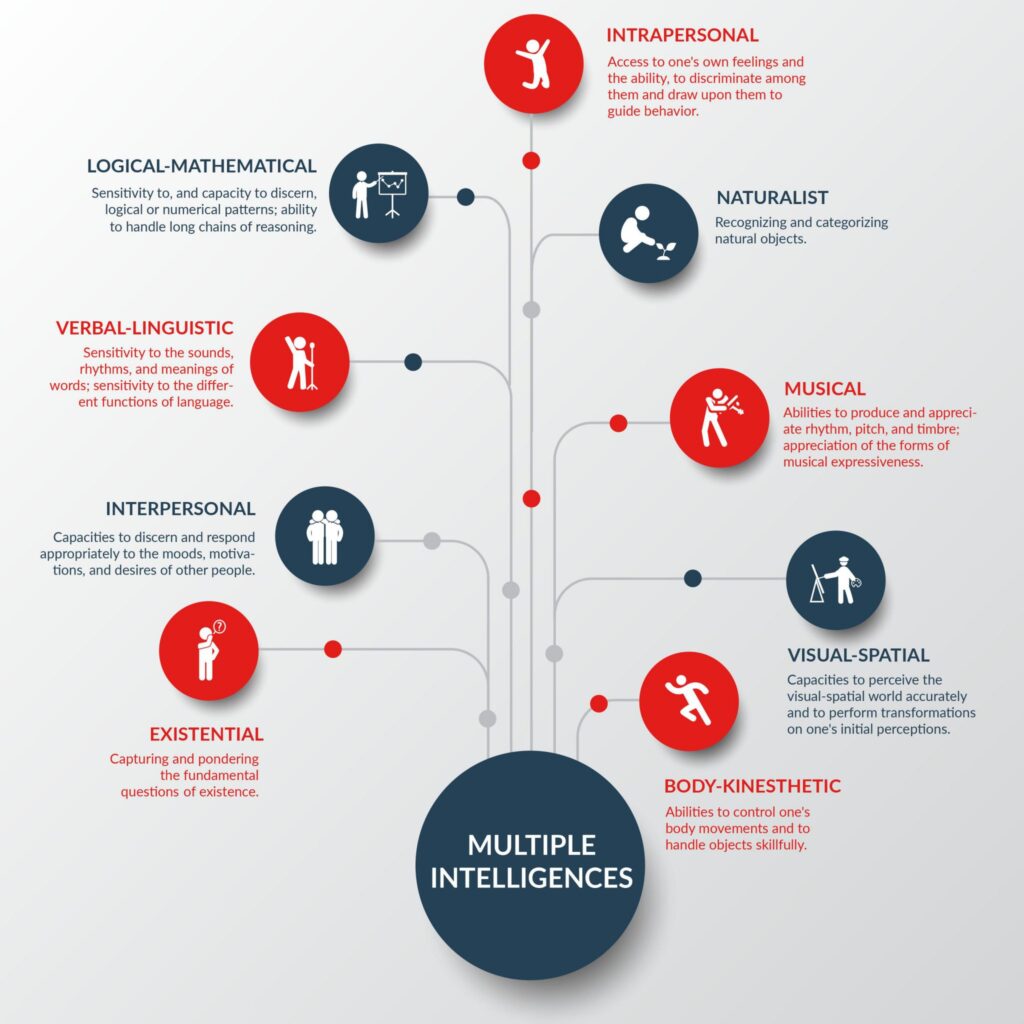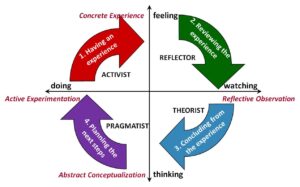Multiple Intelligences Theory
While most people consider the Intelligence Quotient, or IQ for short, as “the” measurement of a person’s “Intellectual Potential,” which is a measure of a person’s Fluid and Crystallized Intelligence, Howard Gardner theorizes that people have not just an intellectual capacity but many kinds of Intelligence, including Musical, Logical-mathematical, Interpersonal, Intrapersonal, Spatial-visual, Body-kinesthetic, Verbal-linguistic, and Naturalist Intelligence.

Howard Gardner first outlined the Multiple Intelligences Theory in his 1983 book Frames of Mind: The Theory of Multiple Intelligences. Gardner suggested that all people have different kinds of “intelligence.”
Gardner proposed that eight intelligences can capture people’s full range of abilities and talents. He suggested possibly adding a ninth, known as “Existentialist Intelligence.”
While someone might be influential in a specific area, such as Musical Intelligence, they most likely possess various other abilities. For example, an individual might be intelligent in Verbal, Musical, and Naturalistic Intelligence.
Learning Styles
One common misconception about Multiple Intelligences is that it means the same thing as Learning Styles. According to Gardner, Learning Styles are how an individual approaches various tasks.
Learning styles have been categorized into several ways: visual, auditory, kinesthetic, impulse-reflective, right-brain, and left-brain.
Gardner argues that learning styles do not have clear criteria for where they come from and how they can be recognized and assessed. Instead, he phrases learning techniques as “a hypothesis of how an individual approaches a range of materials.”
For example, if someone is skilled at learning new languages, it doesn’t necessarily mean they prefer to learn through lectures.
Someone with high visual-spatial Intelligence, as a professional painter, may still benefit from using rhymes to remember information.
Learning is fluid and complex, and it’s important to avoid labeling students as one type of learner.
Gardner states, “When one thoroughly understands a topic, one can typically think of it in several ways.”
Verbal-Linguistic Intelligence

Verbal-linguistic Intelligence means you have well-developed verbal skills and sensitivity to words’ sounds, meanings, and rhythms.
Most people can communicate with verbal-linguistic skills at some level.
Those who rate highly on this modality can demonstrate an excellent facility with language fluency, using specific words instead of generalities to communicate accurately in conversation or writing.
People with this intelligence modality may also be adept at learning new languages with ease.
This ability is also displayed through various verbal techniques, such as memorization, storytelling, reading, and remembering information.
It is one of the most loaded general intelligence factors, indicating overall mental ability, and can be tested using a verbal IQ testing model.
Verbal-Linguistic Intelligence Traits
- Good at remembering written and spoken information.
- Enjoys reading and writing.
- Good at debating or giving persuasive speeches.
- Able to explain things well.
- They often use humor when telling stories.
Verbal-Linguistic Intelligence Careers
Logical-Mathematical Intelligence

Logical-Mathematical InteIntelligencens, you can think conceptually and abstractly and discern logical or numerical patterns.
Although mathematics and logic are central points to this modality, hence its name, the real focus here is on the ability to perform critical thinking.
It offers evidence of having the ability to understand an underlying principle.
People who rate highly in this modality can handle numbers, abstractions, and logical reasoning because a higher overall fluid intelligence is present.
Logical-Mathematical Intelligence Traits
- Excellent problem-solving skills.
- They enjoy thinking about abstract ideas.
- Likes conducting scientific experiments.
- Good at solving complex computations.
Logical-Mathematical Intelligence Careers
Musical Intelligence

Musical InteIntelligencens produces and appreciates rhythm, pitch, and timbre.
This modality involves InteIntelligence, acting with tones, sounds, rhythms, and music.
People who are rated highly in this modality often have excellent pitch—some even have absolute pitch. In addition, these individuals are well-equipped to sing, compose music, and play various instruments.
High-modality individuals are also susceptible to meter, tone, pitch, and rhythm.
They tend to be very hard on themselves when they make an error and want melody and timbre to be as perfect as possible.
They learn complex concepts quickly when they are set to music or melody.
Musical Intelligence Traits
- They enjoy singing and playing musical instruments.
- Recognizes musical patterns and tones easily.
- Good at remembering songs and melodies.
- A rich understanding of the musical structure, rhythm, and notes.
Musical Intelligence Careers
Visual-Spatial Intelligence

Visual-spatial Intelligence is the ability to form a mental model of a spatial world and to maneuver and operate using this model.
It is a person’s sensitivity to color, lines, shapes, space, and relationships between these elements.
It is essential to mention that visual-spatial Intelligence does not necessarily have to be associated with visual ability. For example, some blind people have excellent spatial skills.
They imagine what streets and places look like when they close their eyes. As a result, they have an excellent sense of location and love to direct people along the way.
They love drawing, painting, and making sculptures using playdough and clay. Through art, they express their feelings.
They are excellent at interpreting city and subway maps, locating and remembering key points to find their location, and making mental maps using GPS models.
They admire the design of buildings, structures, and parks, focusing on shapes, lines, colors, and spaces.
They enjoy playing games of repetition memory and challenge them to remember images, faces of people, or places.
They take courses related to the visual arts. They love photography, design, and digital art classes.
They use three-dimensional instruments to discover, observe, create structures and cities, or decipher puzzles.
They love to observe and study the different routes on the maps, as well as looking at diagrams and organizing plans.
Through art, they express their feelings and emotions. They capture their thoughts through drawing. They focus on lines, contours, shadows, colors, and expressions.
Visual-Spatial Intelligence Traits
- They enjoy reading and writing.
- Good at putting puzzles together.
- Good at interpreting pictures, graphs, and charts.
- They enjoy drawing, painting, and the visual arts.
- Recognizes patterns easily.
Visual-Spatial Intelligence Careers
Bodily-Kinesthetic Intelligence

Bodily-kinesthetic Intelligence is the ability to control body movements and handle objects skillfully.
Being intelligent requires more than command over thinking processes. It also requires the ability to overcome instinctual urges.
The mind must control bodily motions so that objects can be handled skillfully.
People who rate highly in this modality can also handle issues involving timing.
They can train their responses to correspond with specific movements, actions, or timeframes to accomplish a particular goal.
Individuals who excel in sports, acting, or musical careers rank highly in this intelligence modality.
Law enforcement, military service, and construction also require high modality levels in this area of intelligence success.
It is an intelligence that can be developed over time. Still, individuals must actively participate in the skill for it to grow.
Simulations have proven to be ineffective in enhancing this modality.
Bodily-Kinesthetic Intelligence Traits
- Good at dancing and sports.
- They enjoy creating things with their hands.
- Excellent physical coordination.
- Tends to remember by doing rather than hearing or seeing.
Bodily-Kinesthetic Intelligence Careers
Interpersonal Intelligence

Interpersonal Intelligence: You can detect and respond appropriately to the moods, motivations, and desires of others.
Sometimes, people who rate highly in this intelligence modality are referred to as having high “emotional intelligence.”
This is because individuals equipped with this modality are susceptible to the changing feelings, moods, and motivations of the people around them.
Those with exceptionally high rankings in this modality can even recognize specific emotions and anticipate strangers’ reactions to those emotions.
Most people using this intelligence modality to their advantage look for ways to cooperate with a team or group.
They look for a place where they can fill in a needed gap so everyone can get along without conflict.
Sometimes, this is thought of as being an extravert. Still, introverted personalities can easily rank high in interpersonal Intelligence.
It’s not about liking people; it’s about understanding them at a core level. These folks want to enjoy a good discussion or watch a debate, making them excellent teachers, counselors, or even social workers.
Interpersonal Intelligence Traits
- Good at communicating verbally.
- They are skilled at nonverbal communication.
- Sees situations from different perspectives.
- Creates positive relationships with others.
- Good at resolving conflict in groups.
Interpersonal Intelligence Careers
Intrapersonal Intelligence

Intrapersonal Intelligence means being self-aware and in tune with inner feelings, values, beliefs, and thinking processes.
This intelligence modality is similar to the interpersonal modality but involves looking inward at oneself. It is the ability to understand personal morals and values deeply.
People who rank highly in this modality are very aware of their strengths and weaknesses.
They also know what makes them unique and are unafraid to push that uniqueness out for the world.
A unique trait of the intrapersonal intelligence modality is the ability to predict personal emotions, reactions, and behaviors.
Intrapersonal Intelligence Traits
- Good at analyzing their strengths and weaknesses.
- They enjoy studying theories and ideas.
- Excellent self-awareness.
- Clearly understand the basis for their motivations and feelings.
Intrapersonal Intelligence Careers
Naturalist Intelligence

Naturalist Intelligence means you can recognize and categorize plants, animals, and other natural objects.
This intelligence modality wasn’t part of the original theory of multiple intelligences. Gardner decided to add it in 1995.
People who rank highly in this modality can recognize and identify flora and fauna.
They can also see how personal decisions would affect the natural world and would use their skills in this modality to protect and preserve it.
Naturalist Intelligence Traits
- They are interested in botany, biology, and zoology subjects.
- Good at categorizing and cataloging information easily.
- May enjoy camping, gardening, hiking, and exploring the outdoors.
- Doesn’t enjoy learning unfamiliar topics that have no connection to nature.
Naturalist Intelligence Careers
Existential Intelligence

Also called the ninth InteIntelligence cosmic smarts, Existential Intelligence is the InteIntelligencebig thinking.
Existential InteIntelligencean individual’s capacity or ability to understand and contemplate philosophical topics relating to humanity’s existence, such as the meaning of life, what consciousness is, and how we got here.
People with Existential Intelligence are abstract, philosophical thinkers. They thrive on intellectual debate and aren’t afraid to challenge the norm.
Although curious about the big questions, they don’t always seek concrete answers.
Engaging in philosophical discussions is enough for existential thinkers to satisfy their metaphysical ambitions.
Those with Existential Intelligence are often described as old souls or cosmic citizens. You might have met an old soul or two, or perhaps you’re an old soul yourself.
One of the more interesting things about those with this skill is that they’re often quite aware of their Existential Intelligence; perhaps that’s part of the power of this type of Intelligence.
People who develop their existential Intelligence with these features:
- Critical thinkers who aren’t afraid to challenge the norm.
- Capacity to tackle deep questions regarding their human existence.
- Constantly questioning their meaning and purpose.
- Continually looking to engage in activities that serve their meaning and purpose.
- Easily get caught up in philosophical thoughts and conversations.
- Sometimes, they disengage from daily activities, which they find mundane.
- Higher sensitivity to people in need, often getting involved in charity causes.
- Seeking meaningful learning experiences.
- You are expressing a strong sense of belonging to a global community.
- Involving in social and political reasons.
Here are a few ways to exercise your existential InteIntelligenceyour daily life:
- Give yourself time to daydream
- Keep a dream journal
- Meditate
- Develop your critical thinking skills
- Study ancient and modern philosophers
- Open discussions with friends and family about big-picture ideas
What is the best thing about developing existential strength? You’re bound to learn plenty about the universe and yourself.



